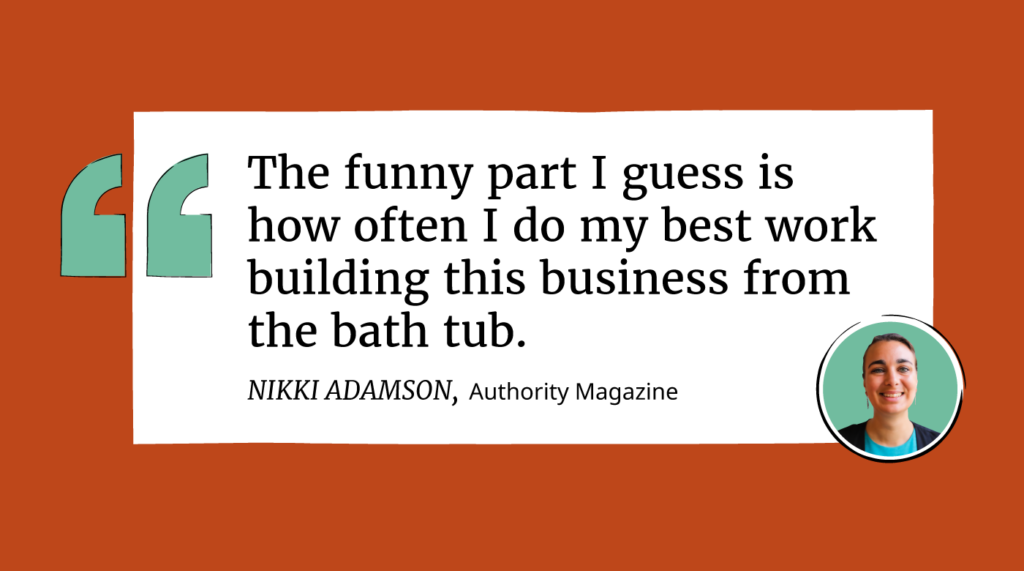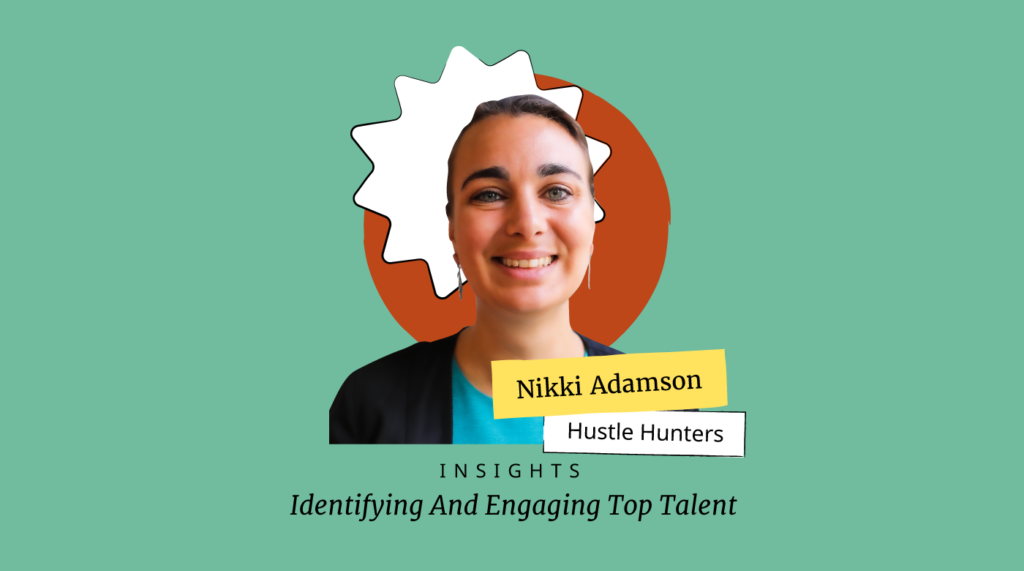Companies are always on the lookout for talented people. In this interview series, we talk to seasoned HR professionals to pick their brains for ideas and insights on finding the right talent for our organizations.
Hi Nikki! Welcome to the series! Before diving in, our readers would love to get to know you. Can you tell us the "backstory" about what brought you to this specific career path?
👋🏽 I’m Nikki (she/her) and I’m an entrepreneur, recruiter, competitor, equity advocate and mom.
I founded Hustle Hunters in 2018, born out of the intersecting needs I’d noticed: 1) dedicated hiring support within innovative early stage startups 2) transparency and trust building within historically excluded candidate groups to grow candidate pools.
I believe firmly that startups are building the innovations that will transform our world, and it’s important that the teams involved in this big work represent our population so that everyone will be served by these groundbreaking solutions.
After running youth sports programming and PE programs with my local YMCA, my early stage startup sales career started at Chute.
The nimbleness, energy and innovation of the startup industry captured my imagination as a breeding ground for early adoption and social enterprise.
After the birth of my daughter Izzy, I joined Milk Stork in a flexible sales and strategic partnerships in a role that exposed me to many moms who had been on the front lines of a similar struggle with the balance of doing big work in the midst of motherhood.
In addition to bringing on many new clients, transitioning towards a recurring revenue model and brokering key industry partnerships, I was able to work closely with Kate Torgerson (CEO, Co-Founder of Milk Stork).
Learning from her how to build a startup environment that does big, industry disrupting work, while also supporting a traditionally marginalized employee group of caregivers, was impactful in who I am now as a leader.
I think it’s also important to fast forward a bit—even though I started the journey centering moms like myself, after realizing that I had different work priorities after having my daughter Izzy (now 5!), we’ve evolved and are constantly learning so that we can better understand and extend invitations to candidate groups that have been excluded from many tech spaces for a variety of reasons.
This growth has blossomed into a firm I’m proud to say has helped over 15 startups hire early team members, with an equity-centered approach, to building the right hiring foundation and building trust within historically excluded candidate communities.
I’ve diligently created an environment for all employees to thrive and connect as humans with each other, clients and the candidates they work with.

It has been said that our mistakes can be our greatest teachers. Can you share a story about the funniest mistake you made when you first started? Then, can you tell us what lesson you learned from that?
Not a mistake, but I have an undiagnosed chronic illness in the wake of giving birth to my daughter which requires me to take a lot of hot baths.
I’d initially thought this was a hindrance to running this company, but it’s consistently led to authentic vulnerability and my ability to create a more genuine connection with folks that I’m realizing it’s also a strength.
The funny part I guess is how often I do my best work building this busienss from the bathtub.
Not quite the “corner office” my childhood self might have imagined—but somehow it’s better as it’s human, and it’s my story.
Can you please give us your favorite "Life Lesson Quote" and how that was relevant to you in your life?
“If you have come to help me you are wasting your time. But if you have come because your liberation is bound up with mine, then let us work together.” - Quote from a group of Aboriginal rights activists from Queensland, Australia in the 1970s
Equity is a theme across my life and where I spend my work time. This quote has continually forced me to refocus my priorities and evaluate my incentives so that my ego is aside, allowing my intentions and impact to be more aligned.
It reminds me that there is always something bigger going on in terms of movements, and getting to play a small part is an opportunity that I should approach with learning and humility (or just leave alone as I’m likely to cause harm).
The incredible book The Wake Up by Michelle Mijung Kim really solidified the application of this quote across my work.
Are you working on any exciting new projects at your company? How is this helping people?
From our learnings in supporting so many early stage startups to build out equitable hiring practices and making their core foundational hires, we’re building out a roster of consultants and coaches to better service the continued belonging and retention of these core voices through DEIB and Operational expert guidance.
Talent relationships are just beginning at offer acceptance, and building in these best practices intentionally for each unique culture is integral to continuing to enhance and empower early teams to do big work.
Wonderful. Now let's jump into the main focus of our series. Hiring can be very time-consuming and challenging. Can you share with our readers a bit about your experience with identifying and hiring talent? What's been your most successful recruitment-related initiative so far?
Listening to, amplifying, and offering value to historically excluded candidate groups has become the foundation of our approach.
This helps us build trust so that we can invite folks into the conversations and provide a space they feel comfortable asking their “real talk” questions to determine if it’s worth their time joining in the process.
Without this intention and effort, the tech industry will just continue looking like it has for decades (it didn’t happen accidentally).
P.S. this takes SO much time, and we do a lot of continuous learning around how to not create harm in these interactions (but is always worth it).
Once talent is engaged, what's your advice for creating a great candidate experience and ensuring the right people go through the process?
Designing the process for that superstar, asking “How would they take this touch point”? Is this enough information for them to still want to join us?”
When faced with a large pile of candidates, it’s so easy to see it as a process of rejecting the not qualified ones to get to the best, but inverting that so we’re trying to usher as many through so they want to join us at the end truly puts us in the best position.
Based on your experience, how can HR and culture professionals work with the broader organization to identify talent needs?
- Demand a seat at the leadership table, the people need an advocate that’s not also advocating for other priorities
- Reiterate that DEIB work happens across the business, isn’t a project or check box, or something siloed within the HR org
- Be clear about what’s missing, and what’s represented demographically
- Build the business case that ties business outcomes to people team goals, build trust across the exec team
Is there anything you see that recruiters, internal or otherwise, do regularly that makes you think, "No, stop doing that!"?
Asking for a project or assessment from candidates before any investment from the hiring team.
We’re not entitled to a candidate’s time and the best folks often balk anyway. We have to show them that we’re investing in the evaluation, and are worth their time to explore potential employment with.
With so much noise and competition out there, what are your top 3 ways to attract and engage the best talent in an industry when they haven't already reached out to you?
- Being an active part of talent communities (slack channels, FB groups, etc.) by not just posting JD’s, but also offering advice where we have knowledge and listening to other needs from the community
- Personalization. Personalization. Personalization. Of who we reach out to, how we reach out, and how we treat them throughout the conversation. We so often hear “I don’t usually respond to recruiters but…” in response to how we slipped into their inbox and saw them as humans first
- Comprehensive job descriptions with tons of transparency (sharing all of the relevant info up front shows that we value candidates enough to not make them play games)
Once people arw onboard, what are your three most effective strategies you use to retain them?
- 32 hour focused work week (learn more here)
- Model work/life balance and health first approach from leadership
- Transparency into the business finances, goals, challenges
Here is the main question of our interview. Can you share five techniques that you use to identify the talent that would be best suited for the job you want to fill? Please share an example for each idea.
- Really deeply scoping of roles and short/long term needs (hard skills, soft skills) before even putting a role out to market.
- Clearly define what you’re evaluating, have a shared language (we use Searchlight for this, and to gain extra signaling from past references around these qualities)
- Invite the people you want directly into the conversation with a personalized approach (i.e. - outbound sourcing)
- Center missing demographics/experiences in the search (if you’re not centering something specifically, you’re perpetuating the status quo)
- Understand the core signaling and qualities we’re looking for, building a process to test explicitly for that.
Lastly, who inspires you, is there a person in the world whom you would love to have a private lunch with, and why? He or she might just see this.
The GOAT (Serena Williams!). Her life as an athlete, woman, mother, partner, entrepreneur, trailblazer, venture leader (ok - I’ll stop here but y’all know what I mean) is a constant inspiration. The entire world is different and better in big ways because of her. Learning about her tradeoffs, inspiration, goals, and learnings would be a dream lunch for me.
Thank you Nikki! Can our readers continue to follow your work online?
You can find me on LinkedIn, or our website.
For the booknerds - also on Storygraph (my list of current reads) or at my local library checking out way too many books (recent favorites: The Wake Up, On a Sunbeam, Kaikeyi, True Biz).

